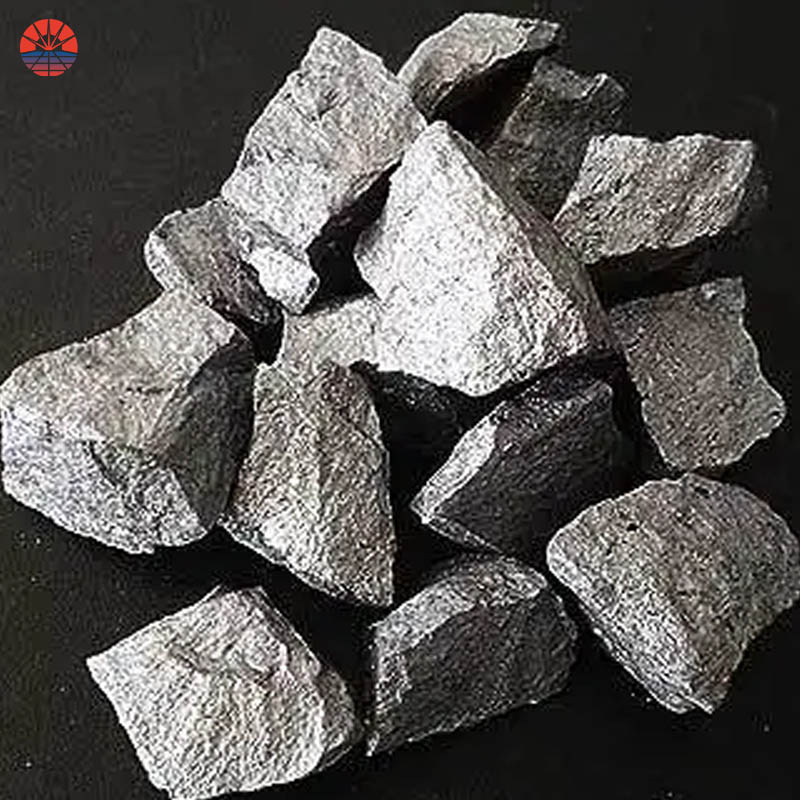Chemical Formula For Ferrosilicon
Using ferrosilicon in the foundry industry provides several important benefits that make it a valuable additive in the casting process. Some of the main advantages of using ferrosilicon in the foundry industry include:
Inoculation: One of the key benefits of using ferrosilicon in foundries is its role as an inoculant. Inoculation is a process used to control the formation of graphite in cast iron. Ferrosilicon, with its high silicon content, promotes the formation of fine graphite flakes or nodules in the cast iron microstructure. The presence of fine graphite distribution enhances the mechanical properties of the cast iron, including increased strength, wear resistance, and reduced brittleness. Inoculation also reduces the risk of casting defects like chill, providing a more uniform and consistent cast iron product.
Grain refinement: Ferrosilicon aids in grain refinement during the solidification of molten metal in the casting process. Fine-grained metal structures result in improved mechanical properties, such as higher strength and better surface finish of the castings. Grain refinement also reduces the risk of shrinkage defects and increases the castings' overall quality.
Improved fluidity: Ferrosilicon can improve the fluidity of molten metal during casting, which is crucial for filling intricate and complex molds. The enhanced fluidity ensures that the molten metal can reach all areas of the mold, reducing the risk of casting defects like incomplete filling or cold shuts.
Increased machinability: The presence of fine graphite flakes or nodules in cast iron produced with ferrosilicon makes the material more machinable compared to some other casting methods. Improved machinability simplifies the process of machining castings into their final shapes, reducing production costs and time.
Controllable properties: The use of ferrosilicon in the foundry industry allows for precise control over the properties of the castings. By adjusting the amount of ferrosilicon and other alloying elements, foundries can tailor the microstructure and properties of the castings to meet specific engineering requirements for different applications.
Cost-effectiveness: Ferrosilicon is relatively affordable and widely available, making it a cost-effective additive in the foundry industry. Its use in cast iron production contributes to making the process economically viable.
Versatility: Ferrosilicon can be used in various foundry processes, and its effects can be tailored to suit different types of cast iron and casting requirements. This versatility makes it a popular choice for foundries producing a wide range of castings for different industries.
In conclusion, the use of ferrosilicon in the foundry industry helps produce high-quality cast iron with improved mechanical properties and enhanced casting characteristics. Its role as an inoculant and grain refiner ensures the production of reliable and consistent castings for various industrial applications.
What's The Ferrosilicon Usage In Foundry Industry
In the foundry industry, ferrosilicon is primarily used as an inoculant and a nodulizer. Let's explore each of these applications:
Inoculant: Inoculation is a process used to control the formation of graphite in cast iron. Cast iron is an alloy of iron, carbon, and silicon, and the type of graphite formed during solidification affects the mechanical properties of the cast iron. To achieve the desired graphite structure, ferrosilicon is added to the molten iron just before casting.
Ferrosilicon, with its high silicon content, promotes the formation of fine graphite flakes in cast iron. Fine graphite distribution improves the mechanical properties of the cast iron, such as increased strength, toughness, and wear resistance. Inoculation also reduces the risk of defects like chill and promotes a more uniform microstructure.
Nodulizer: Nodular or ductile cast iron is another type of cast iron with graphite in the form of nodules or spheroids rather than flakes. Nodular cast iron offers superior mechanical properties compared to grey cast iron, including higher tensile strength, elongation, and impact resistance. The nodulizing process involves the addition of ferrosilicon along with other elements like magnesium (in the form of ferromagnesium) to the molten iron.
The ferrosilicon, along with the ferromagnesium, reacts with the carbon in the iron to promote the formation of graphite nodules. These nodules act as crack arresters, making the cast iron more ductile and less brittle, which significantly enhances its mechanical properties.
By using ferrosilicon as an inoculant and nodulizer in the foundry industry, manufacturers can produce cast iron with tailored properties to meet specific application requirements. The mechanical strength, ductility, and wear resistance of cast iron can be controlled by adjusting the composition of the ferrosilicon and other alloying elements during the casting process. This versatility makes ferrosilicon a valuable additive in foundries, where precise control over material properties is essential for producing high-quality castings for a wide range of applications, including automotive components, pipes, fittings, and machine parts.
Specification
Quality inspection certificate of finished product | |||
Product name | Ferro Silicon | Batch No. | ZC2023-06-13 |
Sampling Site | / | Product specifications | / |
Acceptance date | 2023.06.13 | Report date | 2023.06.14 |
Test items | SH/T 0313-92 | Test results | |
Appearance | This product should be black solid | ||
Si | 75.32 | ||
c | 0.11 | ||
P | 0.03 | ||
s | 0.014 | ||
A1 | 0.77 | ||
Conclusion | Product conforms to specification. | ||








